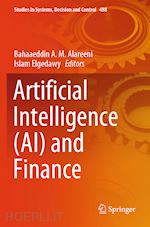
Questo prodotto usufruisce delle SPEDIZIONI GRATIS
selezionando l'opzione Corriere Veloce in fase di ordine.
Pagabile anche con Carta della cultura giovani e del merito, 18App Bonus Cultura e Carta del Docente
Artificial intelligence (AI) has the potential to significantly improve efficiency, reduce costs, and increase the speed and accuracy of financial decision-making, making it an increasingly important tool for financial professionals. One way that AI can improve efficiency in finance is by automating tasks and processes that are time-consuming and repetitive for humans. For example, AI algorithms can be used to analyze and process large amounts of data, such as financial statements and market data, in a fraction of the time that it would take a human to do so. This can allow financial professionals to focus on higher-value tasks, such as interpreting data and making strategic decisions, rather than being bogged down by mundane tasks. AI can also reduce costs in finance by increasing automation and eliminating the need for certain tasks to be performed manually. This can result in cost savings for financial institutions, which can then be passed on to customers in the form of lower fees or better services. AI can be used to identify unusual patterns of activity that may indicate fraudulent behavior. This can help financial institutions reduce losses from fraud and improve customer security. AI-powered chatbots and virtual assistants can help financial institutions provide faster, more efficient customer service, particularly when it comes to answering common questions and handling routine tasks. Some financial institutions are using AI to analyze market data and make trades in real-time. AI-powered trading algorithms can potentially make faster and more accurate trading decisions than humans. In terms of speed and accuracy, AI algorithms can analyze data and make decisions much faster than humans, and can do so with a high degree of accuracy. This can be particularly useful in fast-moving financial markets, where quick and accurate decision-making can be the difference between success and failure.
This book highlights how AI in finance can improve efficiency,reduce costs, and increase the speed and accuracy of financial decision-making. Moreover, the book also focuses on how to ensure the responsible and ethical use of AI in finance.
This book is a valuable resource for students, scholars, academicians, researchers, professionals, executives, government agencies, and policymakers interested in exploring the role of artificial intelligence (AI) in finance. Its goal is to provide a comprehensive overview of the latest research and knowledge in this area, and to stimulate further inquiry and exploration.
Preface.- Introduction.- Papers: Part I: Artificial intelligence Trends in Business Development.- Part II: Artificial intelligence Trends in Finance Development.- References.
Bahaaeddin Alareeni is Assistant Professor of Accounting and Auditing. He got his PhD in Accounting from Vrije University Brussel in Belgium. He did his PhD's thesis in Accounting and Auditing on `'the relative performance of auditors' going concern opinions and statistical failure prediction models for listed companies in Jordan''. His main research interests are in the areas of Corporate Governance, Educational Governance, Earnings Management, Meta- Analysis in Accounting and Finance, Failure prediction, ESG, and Audit quality.
He has a practical experience in the Accounting profession for more than ten years in different organizations, e.g., banking, NGOs, government sector, and private institutions. Additionally, he has academic experience in accounting and finance for more than eight years and taught considerable types of students in different types of courses, mostly all courses of undergraduate accounting and finance programs in addition to several MSc and MBA courses. He developed several undergraduate courses curriculums such as Principles of Accounting I and Principles of Accounting II, Intermediate Accounting, Principle of Finance and Accounting Applications Using Excel Program and Research Methods for Business Students. He served as head of the Business and Finance Department and Head of the Scientific Research and Library Department in the University College of Applied Sciences from the period from 2015 to 2016.
More interestingly, He has more than 50 publications in highly ranked journals, books and international conferences proceedings (ISI-with impact factor, Scopus, ABDC, ABS) . He is Editor/Associate Editor for several books and Journals published by Emerald, Springer, Tylor & Francis. He is Editor inChief of The International Journal of Business Ethics and Governance (IJBEG), and Associate Editor of the Journal of Sustainable Finance and Investment (JSFI), Taylor & Francis. He was assigned is a guest editor of a number of special issues such as Journal of Sustainable Finance and Investment (JSFI), Taylor & Francis, Journal of Strategic Marketing (JSM), Taylor & Francis, International Journal of E-Business Research (IJER), IGI publisher, and Journal of Decision Systems (JDS), Taylor & Francis. He has edited several books published by Springer on very important and trendy topics such as The Fourth Industrial Revolution: Implementation of Artificial Intelligence for Growing Business Success; Technologies and Entrepreneurship in Business Development; and Applications of Artificial Intelligence in Business, Education and Healthcare. He received research grants from the Palestine Monetary Authority (PMA) in 2015. He got awards from the Bank of Jordan -Gaza Branch (2000), and the Arabic Organization for Student support, Jerusalem (1997). He worked as a trainer for several fields and supervised more than 15 Master students.











Il sito utilizza cookie ed altri strumenti di tracciamento che raccolgono informazioni dal dispositivo dell’utente. Oltre ai cookie tecnici ed analitici aggregati, strettamente necessari per il funzionamento di questo sito web, previo consenso dell’utente possono essere installati cookie di profilazione e marketing e cookie dei social media. Cliccando su “Accetto tutti i cookie” saranno attivate tutte le categorie di cookie. Per accettare solo deterninate categorie di cookie, cliccare invece su “Impostazioni cookie”. Chiudendo il banner o continuando a navigare saranno installati solo cookie tecnici. Per maggiori dettagli, consultare la Cookie Policy.